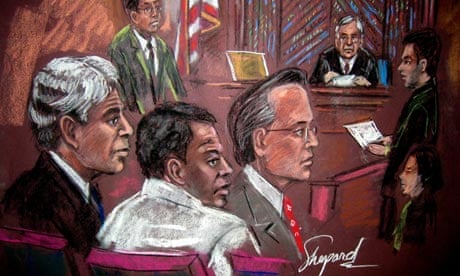Leading Republicans have demanded that Barack Obama scrap plans to try the organisers of the 9/11 attacks in civilian courts after a New York jury acquitted an alleged terrorist of more than 200 murder charges over al-Qaida's bombing of US embassies in east Africa.
Ahmed Khalfan Ghailani's conviction on the sole charge of conspiracy to destroy government property in the 1998 bombings has reignited the bitter debate about Obama's plan to move the alleged 9/11 mastermind, Khalid Sheikh Mohammed, and other Guantánamo detainees to the US and try them in civilian courts.
Ghailani was acquitted on 284 other charges, mostly murder and conspiracy, over the deaths of 213 people, including 12 Americans, in the attacks on the embassies in Nairobi and Dar es Salaam. He faces imprisonment for 20 years to life.
Mitch McConnell, Republican Senate leader, said the verdict was "all the proof we need that the administration's approach to prosecuting terrorists has been deeply misguided and indeed potentially harmful as a matter of national security".
"Most Americans wondered why we would even take the chance. And now they're wondering when the administration will admit it was wrong and assure us just as confidently that terrorists will be tried from now on in the military commission system that was established for this very purpose at the secure facility at Guantánamo Bay, or detained indefinitely, if they cannot be tried without jeopardising national security."
Obama has argued that the military commissions were damaging to the US because much of the world regarded them as unjust. The military tribunals were tainted by the mistreatment and torture of prisoners.
The justice department says federal civilian courts have convicted more than 400 people on terrorism-related charges since 9/11. Military commissions have secured convictions for just five.
Peter King, who is expected to become head of the homeland security committee in the new Congress in January, said he would use that position to hold hearings into what he has called the administration's "insane" handling of terrorism trials. "This is a tragic wake-up call to the Obama administration to immediately abandon its ill-advised plan to try Guantánamo terrorists [in civilian courts]," he said. "We must treat them as wartime enemies and try them in military commissions at Guantánamo."
King blamed Ghailani's acquittal on all but one count on rules of evidence in civilian courts which forced the judge, Lewis Kaplan, to exclude a witness who the US authorities learned about from information obtained during CIA interrogation. Ghailani's lawyers claim he was tortured.
The witness, Hussein Abebe, was to have testified that he sold Ghailani the explosives used to attack the US embassy in Dar es Salaam. The judge ruled the information had been improperly obtained.
"Once the judge excluded the testimony of a witness who would have connected Ghailani to these horrible acts, which would have brought about a conviction, it became very, very difficult to convict him. This is the real danger, the real insanity if you will, of bringing these cases in a civilian court," said King. "If this had been in a military commission, that evidence would have been allowed and I'm confident that Ghailani would have been convicted."
However, Kaplan in his ruling on the witness said that the testimony would also have been excluded by a military judge because of restrictions on the use of evidence obtained through coercion.
But today, the nuances of legal procedure were largely drowned under a barrage of attacks on the president over the case. Keep America Safe, a rightwing group run by Liz Cheney, the former vice-president's daughter, and other hardline conservatives, called the decision to try Ghailani in a civilian court "irresponsible and reckless".
"The Obama administration recklessly insisted on a civilian trial for Ahmed Ghailani, and rolled the dice in a time of war," it said. "It's dangerous. It signals weakness in a time of war."
King said he doubts Mohammed will go on trial in New York in the near future. "I doubt if he's going to be tried in the next several years. I think the president has boxed himself in to a corner and I think you'll find Khalid Sheikh Mohammed kept in Guantánamo along with the other 9/11 defendants and he'll be held indefinitely and sometime after 2012, depending on what happens in that election, then the president will decide," he said. "If they have a trial in Guantánamo it'll look like too much of a reversal for the president. I think they're just going to put everything on ice and let him sit there for the next several years."
Prize captive proves a headache
Barack Obama favours a civilian court because he says treating Mohammed as a common criminal and giving him the same protections afforded to Americans will weaken the al-Qaida operative's claim to be fighting a legitimate war against America.
But others fear that the rules of a civilian court – which will preclude the use of testimony or other evidence obtained through torture of while Mohammed was held in secret CIA prisons for years – will weaken the case against him and risk the embarrassment of his acquittal on at least some of the charges against him. Mohammed was waterboarded 183 times according to a justice department memo obtained by the New York Times.
Some New York politicians are also against having his trial in the city he attacked because of concerns about costs and security.
